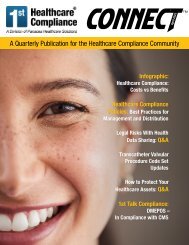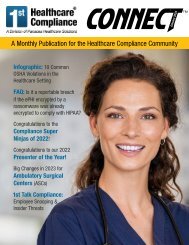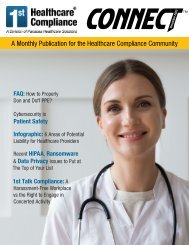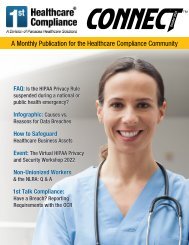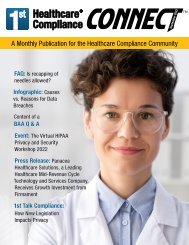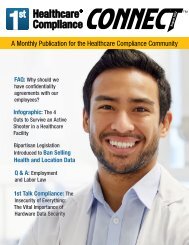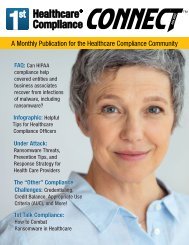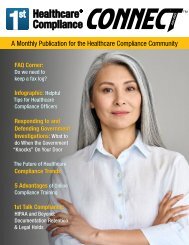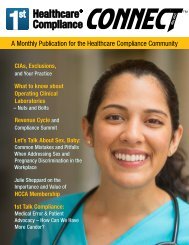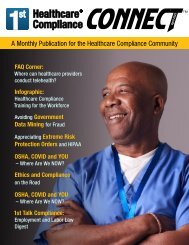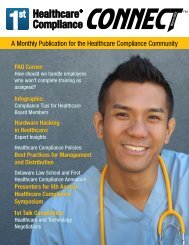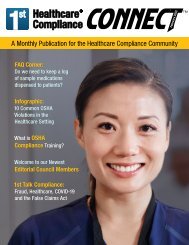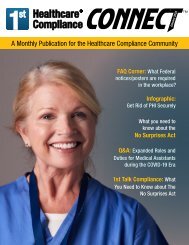First Healthcare Compliance CONNECT- February 2018
You also want an ePaper? Increase the reach of your titles
YUMPU automatically turns print PDFs into web optimized ePapers that Google loves.
The most comprehensive healthcare<br />
compliance course yet!<br />
Improving patient safety, decreasing rates of error, and minimizing<br />
medical liability costs are important objectives of health care reform<br />
in the United States. Many experts believe that to accomplish these<br />
goals, organizations must adopt principles of transparency and just<br />
culture, and engage in effective and honest communication with<br />
patients and families as well as proactively seek early resolution of<br />
claims after adverse events caused by inappropriate care. In recent<br />
years, forward-thinking health systems and liability insurers have<br />
developed communication and resolution programs (CRPs) designed<br />
to encourage full disclosure of unintended patient care outcomes to<br />
patients and their families. Such efforts involve an investigation of the<br />
incident, an apology, an explanation with complete revelation of the<br />
facts, and when appropriate, reimbursement or compensation. These<br />
programs represent a systematic strategy to respond to patients when<br />
something goes awry, and are integral to patient quality and safety. In<br />
part, they are founded on the principles of respect, transparency, and<br />
honesty and may improve patient safety outcomes and quality of care<br />
by providing an introspective review of the occurrence and promoting<br />
learning opportunities from any mistakes, errors, or near misses. CRPs<br />
meet the needs of patients, their families, and caregivers when an<br />
adverse event occurs in patient care, and address any identified patient<br />
safety and quality gaps.<br />
Alternatives to Medical Malpractice Litigation<br />
Many patient safety leaders view these programs as an alternative<br />
to the costly and lengthy malpractice litigation process which fails to<br />
answer fundamental questions about the nature of the harm and basic<br />
details of the incident. Often, the traditional response to patient harm<br />
involves the disclosure of limited information and avoidance of admissions<br />
of fault–a “deny and defend” model. These interactions quickly<br />
turn adversarial, and the open communication normally accorded the<br />
patient-physician relationship is abandoned. For health care providers,<br />
the “deny and defend” paradigm provides little incentive for investigation<br />
of the event because of the fear that a compensable error might<br />
be revealed. Thus, there is no analysis of the event and organizations<br />
are unable to learn how to prevent a similar catastrophe. This loss of a<br />
learning opportunity can derail efforts to improve patient care.<br />
One of the seminal communication and resolution programs was<br />
developed and implemented at the University of Michigan Health<br />
System (UMHS). This “Michigan” model and other programs, mostly<br />
notably the “Seven Pillars” approach at the University of Illinois Medical<br />
Hospital and Health Sciences System (“UIH”), changed the way these<br />
organizations responded to patient injuries and medical malpractice<br />
claims. These programs are known collectively as early settlement<br />
models as opposed to another model involving limited reimbursement,<br />
which typically covers nominal out-of-pocket expenses and loss<br />
of time, and may adjust the billing for services. UMHS’s efforts were<br />
driven by three guiding principles: (1) compensate quickly and fairly,<br />
(2) vigorously defend appropriate care, and (3) reduce patient injury<br />
and claims by learning from mistakes. The health system sought open<br />
communication with patients about an adverse event but also critically<br />
investigated the incident to assess whether the care comported<br />
with the standard of care and was reasonable, offered an apology, and<br />
provided an early offer of compensation when the care fell below the<br />
standard of care or was unreasonable in the circumstances. A multidisciplinary<br />
internal committee reviews the event to determine if the care<br />
provided was medically reasonable and whether the care negatively<br />
affected the outcome. If warranted, peer review, quality improvements,<br />
or additional education and training may be recommended. This program<br />
has successfully reported a reduction in claims, malpractice<br />
lawsuits, median time to claim report to resolution, defense costs, and<br />
average settlement amounts.<br />
UIH adopted a related approach premised upon similar underlying principles<br />
as well as the CANDOR program (communication and optimal<br />
resolution program developed by the Agency for <strong>Healthcare</strong> Quality<br />
and Research). The “UIH’s Seven Pillars” strategy is characterized<br />
by prompt reporting of the incident, rapid review and investigation by<br />
safety and risk management, early communication with patient and<br />
family (within 15-30 minutes of the unanticipated event), full disclosure,<br />
apology, and a rapid remedy (holding hospital and professional<br />
fees), a focus on learning opportunities and system improvement, data<br />
tracking and evaluation, and education and training. The results of this<br />
program have been profound. Having open and honest communication<br />
with patients and their families and offering an early financial resolution<br />
package after an adverse event has not resulted in significant<br />
liability concerns but has actually led to lower claims, legal fees and<br />
expenses, costs per claim, settlement costs, self-insurance costs, and<br />
mean times to claim closure. These findings closely track the UMHS<br />
experience.<br />
The Fundamentals is a user-friendly, four-module course designed<br />
to help healthcare professionals understand the<br />
essential principles and practices of compliance.<br />
Visit 1sthcc.com/shop to<br />
register today!<br />
Written by our “dream team” of<br />
healthcare providers and attorneys,<br />
The Fundamentals Course is packed<br />
with useful, easy-to-understand<br />
information that covers HIPAA, OSHA,<br />
employment law and enforcement of<br />
Federal healthcare laws. The course<br />
takes less than four hours to complete.<br />
The <strong>Compliance</strong> Certification Board<br />
(CCB)® has approved this event for up<br />
to 4.4 non-live CCB CEUs.<br />
12 <strong>First</strong> <strong>Healthcare</strong> <strong>Compliance</strong>, LLC © <strong>2018</strong><br />
Contact Toll Free: 888-54-FIRST 13




